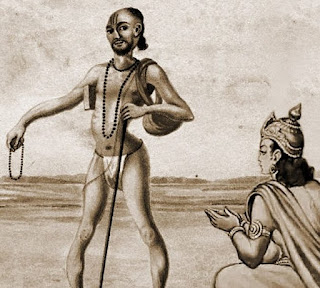Asthavakra (8)--Notable Mortals Who Lived Through Most of the Four Eras
https://www.amazon.in/dp/9390758173?ref=myi_title_dp
Here is Asthavakra , one among 116 mortals, who found frequent references in the texts of Puranas and great epic, Mahabharat. A careful, meticulous and sincere study of these ancient literary composition reveals that most of such notables not merely find references in, but they actively interacted with the other people living through periods of Vedas, Ramayan & Mahabharat.
8. Asthavakra—Asthavakra was a sage in ancient India. Asthavakra means ‘eight bends or deformities’.
In ancient India, the sage Asthavakra was known to be a very intelligent and spiritually well-advanced rishi who realized self or Brahm. Sage Uddalak ran a school (Ashram) teaching Vedic knowledge. Kahoda was one of his best disciples. Uddalak was so pleased with him that he had his daughter Sujata married to him. Sujata, eventually got pregnant and in the natural desire of wanting her child to imbibe spirituality and intelligence, began to sit in the classes taught by Uddalak and Kahoda, listening to their chanting of mantras. Sujata used to attend the classes with rapt attention. One day, Kahoda recited the Vedas within hearing reach of the foetus growing in the womb of Sujata. The developing child within, already aware of the correct pronunciation of every syllable, squirmed in distress whenever Kahoda pronounced a syllable wrong. Sujata informed Kahoda that he had pronounced the syllable wrongly as indicated by the child in the womb. This happened on eight occasions. Kahoda perceived this as arrogance on the part of child, who had yet to take birth, so he cursed the foetus with eight deformities. When the baby was born it had eight bends and the new born was named Asthavakra.[1]
Around the time Asthavakra was born, his father Kahoda was invited to argue with the great philosopher Bandi. Bandi was the son of Varun, the ruler of all water bodies, and was sent in disguise to get sages and rishi, to conduct a ritual that Varun wanted to perform. Bandi easily defeated Kahoda in arguments. As per the rules of the contest, Bandi's victims had to 'drown' themselves in the river Ganges. Kahoda had to submerge himself in the river. Asthavakra was therefore raised by Uddalak and within a short time mastered everything that was expected of a Brahman. Uddalak took pains to see that Asthavakra was always kept in the dark about the fate of his father. However, Asthavakra came to know the truth when his young uncle, Shwetaketu advertently, blurted out that the person who Asthavakra thought was his father, was, in fact, not his father but maternal grandfather. Asthavakra then demanded the truth from his mother and decided to confront Bandi and defeat him in an argument.
Asthavakra made his way to the King Janak’s palace and presented himself as a challenger. The kind-hearted King could not bear the thought of someone so young losing to Bandi and meeting the same fate as countless other Brahmans and tried to dissuade the young boy. Asthavakra, was, however adamant, and after an initial test, Janak decided to let him face Bandi. Asthavakra won the argument and demanded that Bandi restore the life of all the sages and Brahmans he had forced to be drowned. One of the conditions of the contest was that if Bandi loses he would grant any wish of his vanquisher. By this time, Varuna's ritual was also complete. When Bandi was defeated, he revealed his true identity, and the reason behind the drowning of his victims. At Bandi's request, Varuna brought Brahmans and sages to surface. Kahoda was extremely pleased with his son's intelligence and knowledge.[2]
Later Asthavakra grew into a spiritually advanced rishi and realised Atman. He went to Mithila and instructed King Janak about the concept of Atman. These teachings form the content of the Asthavakra Gita or Asthavakra Sanhita as it is sometimes called.
Asthavakra was also one of the rishis who participated in the coronation ceremony of Shri Ram, after his return to Ayodhya from exile.[3] It was due to his curse that the wives of Shri Krishan were reduced to mere human mortals from their higher existence as apsaras.[4]
[1] Mahabharat, Van Parv, Adhyay 132-133.
[2] Mahabharat, Van Parv, Adhyay 134.
[3] Puranic Encyclopedia, Vettam Mani, see Astavakra.
[4] Agni Puran, Adhyay 15, ‘Yadukul ka Sanhar aur Pandavo ka swarg-gaman’.

No comments:
Post a Comment